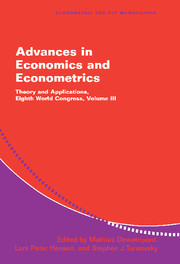Book contents
- Frontmatter
- Contents
- List of Contributors
- Preface
- 1 Contracting Constraints, Credit Markets, and Economic Development
- 2 Factor Models in Large Cross Sections of Time Series
- 3 Macroeconomic Forecasting Using Many Predictors
- “Big Data” Dynamic Factor Models for Macroeconomic Measurement and Forecasting: A Discussion of the Papers by Lucrezia Reichlin and by Mark W. Watson
- 4 How Severe Is the Time-Inconsistency Problem in Monetary Policy?
- 5 New Perspectives on Monetary Policy, Inflation, and the Business Cycle
- Comments on Papers by Stefania Albanesi, V. V. Chari, and Lawrence J. Christiano and by Jordi Galí
- 6 Consumption Smoothing and Extended Families
- 7 Computational Methods for Dynamic Equilibria with Heterogeneous Agents
- Index
Comments on Papers by Stefania Albanesi, V. V. Chari, and Lawrence J. Christiano and by Jordi Galí
Published online by Cambridge University Press: 06 January 2010
- Frontmatter
- Contents
- List of Contributors
- Preface
- 1 Contracting Constraints, Credit Markets, and Economic Development
- 2 Factor Models in Large Cross Sections of Time Series
- 3 Macroeconomic Forecasting Using Many Predictors
- “Big Data” Dynamic Factor Models for Macroeconomic Measurement and Forecasting: A Discussion of the Papers by Lucrezia Reichlin and by Mark W. Watson
- 4 How Severe Is the Time-Inconsistency Problem in Monetary Policy?
- 5 New Perspectives on Monetary Policy, Inflation, and the Business Cycle
- Comments on Papers by Stefania Albanesi, V. V. Chari, and Lawrence J. Christiano and by Jordi Galí
- 6 Consumption Smoothing and Extended Families
- 7 Computational Methods for Dynamic Equilibria with Heterogeneous Agents
- Index
Summary
The theme of these comments is that we need to remain vigilant against the possibility that “standard” modeling conventions in macroeconomics, originally introduced as experimental or tentative, start to be used unquestioningly, despite serious drawbacks. It is, in a sense, unfair to focus such comments on the papers presented in this session, because the conventions to be criticized are not at all special to these papers, but there must be some point at which we step back and consider where the conventions in our literature are headed, and a quinquennial World Congress seems as appropriate an occasion as any for doing this.
I consider the papers by Galí and by Albanesi, Chari, and Christiano (hence-forth ACC) that appear in this volume; and also the empirical paper (Galí and Gertler, 1999) that forms the foundation for much of the paper in this volume that Jordi Galí presented.
OPTIMAL MONETARY AND FISCAL POLICY
Both papers discuss optimal monetary policy in the context of general equilibrium models. General equilibrium models, with their own internally generated, explicit measures of welfare, allow us to avoid postulating an ad hoc objective function for the policy authority, instead evaluating policy directly in terms of its welfare implications for private agents.
- Type
- Chapter
- Information
- Advances in Economics and EconometricsTheory and Applications, Eighth World Congress, pp. 198 - 208Publisher: Cambridge University PressPrint publication year: 2003



